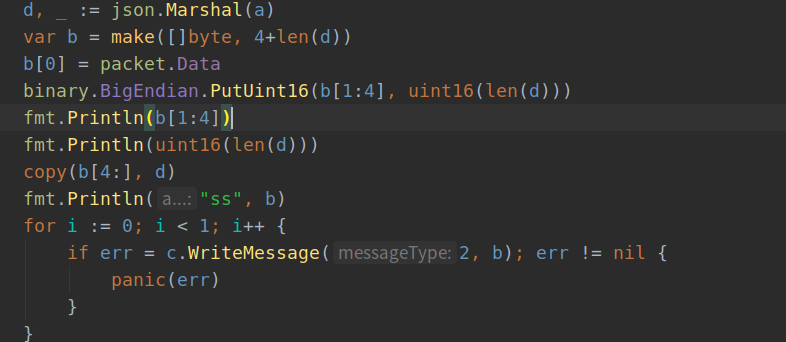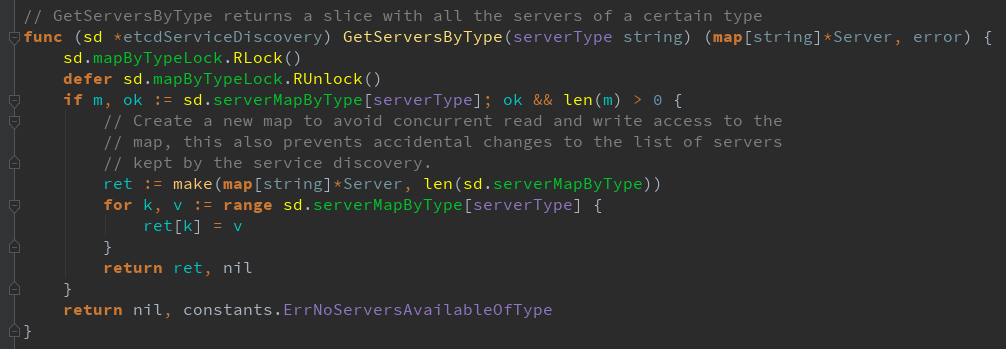I used the chat example provided by Pitaya for testing, and found that sometimes there were problems of sticky packages and garbled codes in the messages I received.
onMembers
{"members":[]}
request room.join succesed.
2.无限期等待中...
onNewUser
{"content":"New user: 98"}
onMessage
{"name":"guest1552192965717","content":"sss"}_pi�
onMessage
{"name":"guest1552192965717","content":"大家好"}
onMessage
{"name":"曹江华","content":"我们fdsf 震"}
onMessage
{"name":"曹江华","content":"无可奈何花落去"}
onMessage
{"name":"曹江华","content":"工"}
onMessage
{"name":"曹江华","content":"需要 无可奈何1534!@#¥#@"}","content":"��
onMessage
{"name":"曹江华","content":"fsaf11城无可奈何花落去 "}�
onMessage
{"name":"曹江华","content":"dddddddd"}��花��
Above are some examples of the messages I received.
onMessage
{"name":"guest1552192965717","content":"sss"}_pi�
onMessage
{"name":"曹江华","content":"需要 无可奈何1534!@#¥#@"}","content":"��
onMessage
{"name":"曹江华","content":"dddddddd"}��花��
package dog.tale.pitaya;
import org.bytedeco.javacpp.*;
public class PitayaTest {
static {
//System.load("/Users/arden/data/repository/tale/PitayaClientJava/lib/libpitaya-mac.bundle");
System.loadLibrary("pitaya-mac");
System.loadLibrary("jniPitaya");
}
public static void main(String...args) {
Object lock = new Object();
try {
Pitaya.pc_lib_set_default_log_level(Pitaya.PC_LOG_DEBUG);
Pitaya.pc_lib_client_info_t clientInfo = new Pitaya.pc_lib_client_info_t();
Pitaya.pc_lib_init((Pitaya.Pc_log_int_BytePointer) null, null, null, null, clientInfo);
Pitaya.pc_client_config_t config = new Pitaya.pc_client_config_t();
config.transport_name(Pitaya.PC_TR_NAME_UV_TCP);
config.enable_reconn(1);
config.conn_timeout(120);
config.reconn_max_retry(Pitaya.PC_ALWAYS_RETRY);
config.reconn_delay(30);
Pitaya.pc_client_init_result_t result = Pitaya.pc_client_init(null, config);
Pitaya.pc_client_t client = result.client();
Pitaya.pc_client_connect(client, "tujiao.co", 3252, null);
Pitaya.pc_client_add_ev_handler(client, new Pitaya.pc_event_cb_t() {
@Override
public void call(Pitaya.pc_client_t client, int ev_type, Pointer ex_data, BytePointer arg1, BytePointer arg2) {
System.out.println("aaa: " + ev_type);
if (ev_type == Pitaya.PC_EV_CONNECTED) {
Pitaya.pc_string_request_with_timeout(client, "room.join", null, null, 15, new Pitaya.pc_request_success_cb_t() {
@Override
public void call(Pitaya.pc_request_t req, Pitaya.pc_buf_t resp) {
System.out.println("request room.join succesed.");
}
}, new Pitaya.pc_request_error_cb_t() {
@Override
public void call(Pitaya.pc_request_t req, Pitaya.pc_error_t error) {
}
});
Pitaya.pc_string_notify_with_timeout(client, "room.message", "{\"name\":\"arden\", \"content\":\"welcome arden(他乐好棒)\"}", null, 15, new Pitaya.pc_notify_error_cb_t() {
@Override
public void call(Pitaya.pc_notify_t req, Pitaya.pc_error_t error) {
System.out.println(error);
}
});
}
}
}, null, null);
Pitaya.pc_string_request_with_timeout(client, "room.join", null, null, 15, new Pitaya.pc_request_success_cb_t() {
@Override
public void call(Pitaya.pc_request_t req, Pitaya.pc_buf_t resp) {
System.out.println("request room.join succesed.");
}
}, new Pitaya.pc_request_error_cb_t() {
@Override
public void call(Pitaya.pc_request_t req, Pitaya.pc_error_t error) {
}
});
Pitaya.pc_string_notify_with_timeout(client, "room.message", "{\"name\":\"arden\", \"content\":\"welcome arden(他乐好棒Arden)\"}", null, 15, new Pitaya.pc_notify_error_cb_t() {
@Override
public void call(Pitaya.pc_notify_t req, Pitaya.pc_error_t error) {
System.out.println(error);
}
});
Pitaya.pc_client_set_push_handler(client, new Pitaya.pc_push_handler_cb_t() {
@Override
public void call(Pitaya.pc_client_t client, BytePointer route, Pitaya.pc_buf_t payload) {
System.out.println(route.getString());
System.out.println(payload.base().getString());
}
});
try {
Thread.sleep(5000);
} catch (Exception e) {
}
while (true) {
synchronized (lock) {
System.out.println("2.无限期等待中...");
lock.wait();
}
}
} catch (Exception e) {
e.printStackTrace();
}
}
}





